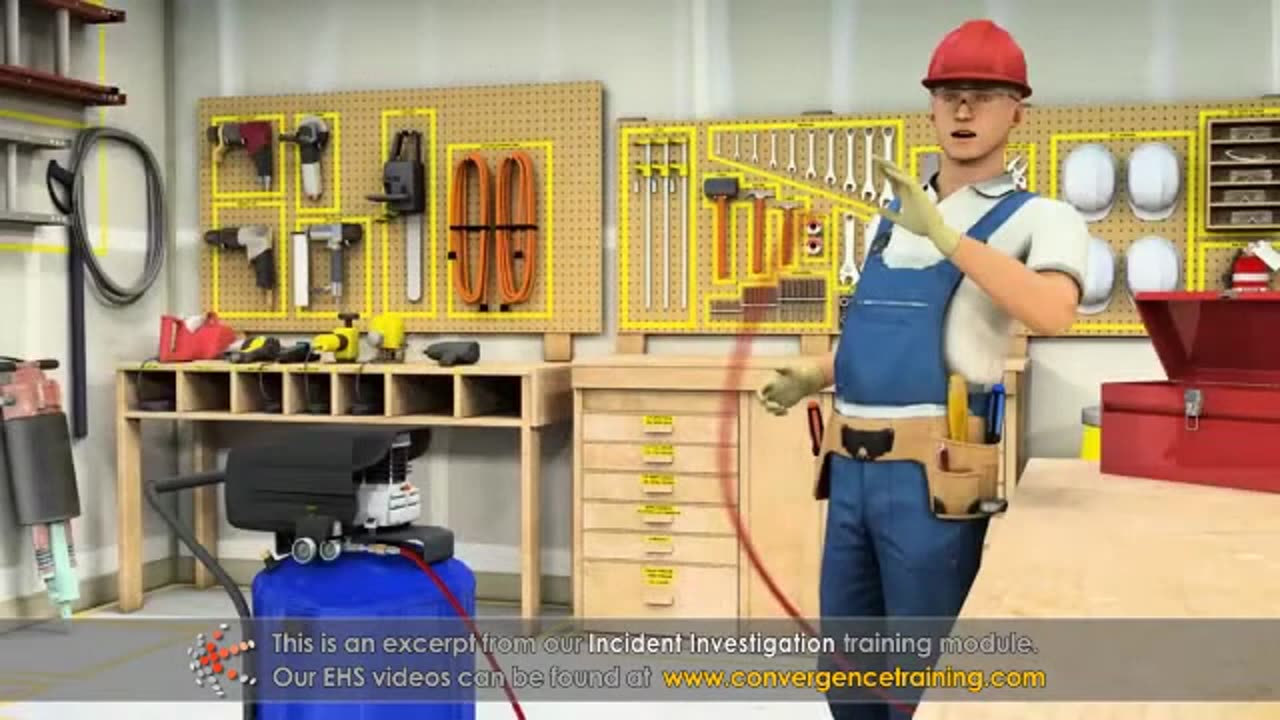Premium Only Content

Incident Investigation Training
### Incident Investigation Training
Incident investigation is a critical process for identifying the root causes of workplace incidents and implementing corrective actions to prevent recurrence. This training provides the knowledge and skills necessary to conduct effective investigations, ensuring safety, compliance, and continuous improvement.
---
#### **Objectives of Incident Investigation Training**
1. Understand the purpose of incident investigations.
2. Learn a systematic approach to identifying root causes.
3. Develop skills to document findings and implement corrective actions.
4. Foster a culture of safety and accountability in the workplace.
---
### **Key Elements of Incident Investigation Training**
#### **1. Understanding Incident Investigation**
- **Definition:** A structured process to determine what happened, why it happened, and how to prevent it from happening again.
- **Types of Incidents:** Includes near misses, injuries, illnesses, property damage, or environmental impacts.
- **Goals of Investigation:**
- Identify contributing factors.
- Prevent future incidents, not to assign blame.
- Comply with legal and organizational requirements.
---
#### **2. The Investigation Process**
1. **Immediate Actions:**
- Ensure the safety of employees and secure the incident site.
- Provide medical assistance if necessary.
- Preserve evidence and prevent tampering.
2. **Team Formation:**
- Assign a trained investigation team, including supervisors, safety officers, and subject-matter experts.
- Ensure team members are impartial and have no conflict of interest.
3. **Data Collection:**
- **Interviews:** Speak with witnesses and involved parties. Ask open-ended questions like "Can you describe what you saw?"
- **Evidence Gathering:** Take photos, videos, and collect physical evidence. Review records such as maintenance logs, training documents, and work procedures.
- **Timeline Creation:** Develop a sequence of events to understand how the incident unfolded.
4. **Root Cause Analysis:**
- Use tools like the **5 Whys**, **Fishbone Diagram (Ishikawa)**, or **Fault Tree Analysis** to identify root causes.
- Look beyond surface causes to uncover underlying systemic issues (e.g., inadequate training, equipment failure, procedural gaps).
5. **Recommendations and Corrective Actions:**
- Develop specific, measurable, and achievable corrective actions to address root causes.
- Assign responsibilities and deadlines for implementation.
6. **Documentation and Reporting:**
- Prepare a comprehensive report that includes:
- Incident description.
- Findings and root causes.
- Corrective actions.
- Lessons learned.
---
#### **3. Post-Investigation Actions**
- **Follow-Up:** Ensure corrective actions are implemented and effective.
- **Communication:** Share lessons learned with employees to prevent similar incidents.
- **Review:** Periodically review past investigations to ensure long-term improvements.
---
### **Key Skills for Investigators**
- **Observation:** Ability to identify key details and patterns.
- **Communication:** Conducting clear and unbiased interviews.
- **Critical Thinking:** Analyzing evidence and identifying root causes.
- **Team Collaboration:** Working effectively with diverse stakeholders.
---
### **Training Activities**
1. **Case Studies:**
- Analyze real or simulated incidents using root cause analysis tools.
- Discuss how corrective actions could have prevented the incident.
2. **Role-Playing:**
- Conduct mock interviews and investigations.
- Practice collecting evidence and writing incident reports.
3. **Hands-On Exercises:**
- Use physical scenarios or virtual tools to investigate simulated incidents.
- Apply investigation frameworks to identify root causes.
---
### **Key Takeaways**
- Investigations aim to improve safety, not assign blame.
- Systematic processes ensure thoroughness and fairness.
- Continuous improvement relies on learning from incidents.
Let me know if you’d like additional materials, such as checklists, templates for reports, or scenario exercises!
-
 1:40:22
1:40:22
Game On!
13 hours ago $3.86 earnedNFL Thursday Night Football Seahawks at Bears EXPERT Picks!
25.2K9 -
 1:50:54
1:50:54
xBuRnTx
2 hours agoWho's Ready for New Years!
16.3K1 -
 12:09
12:09
Tactical Advisor
14 hours agoSmith & Wesson Shield Plus Carry Comp
12K1 -
 4:35:25
4:35:25
Father Russell
8 hours agoDelta Force | Not A Woman? | Mad Martigan Time
54.8K4 -
 3:29:42
3:29:42
BrookieMonster
15 hours ago $44.15 earnedChristmas Stream: Marvel Rivals with CallmeSeags 🎄
175K13 -
 LIVE
LIVE
TheSaf3Hav3n
4 days ago| RUMBLES FIRST SUBATHON IS HERE!!! | DAY 4 |
394 watching -
 6:54
6:54
Dr. Nick Zyrowski
2 hours agoHIGH PROTEIN DIET Fixes Your Metabolism! - Weight Loss Not Required
14.6K5 -
 3:14:33
3:14:33
Joe Donuts Gaming
17 hours ago🟢 Live : Christmas is Here!! | Fortnite, Caroling, Light Tours and Donos !!
92.5K15 -
 6:02:38
6:02:38
CLUJ
16 hours agoCHRISTMAS EVENING HYPE!! LETS HAVE FUN GAMING!!
73.3K7 -
![I AM FINALLY BACK :: PUBG: BATTLEGROUNDS :: RUMBLE NOW HAS GIFTED SUBS!!! [Merry Christmas] {18+}](https://1a-1791.com/video/fwe1/22/s8/1/e/f/C/6/efC6v.0kob-small-I-AM-FINALLY-BACK-PUBG-BATT.jpg) 9:57:19
9:57:19
a12cat34dog
18 hours agoI AM FINALLY BACK :: PUBG: BATTLEGROUNDS :: RUMBLE NOW HAS GIFTED SUBS!!! [Merry Christmas] {18+}
65.5K8